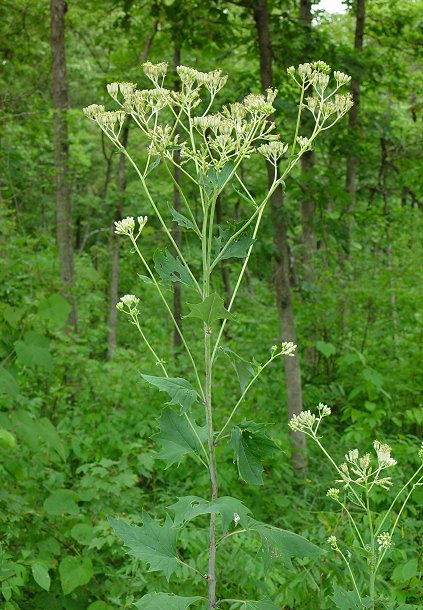Arnoglossum atriplicifolium (L.) H. Rob.
Pale Indian Plantain

Native
CC = 4
CW = 5
MOC = 49
© SRTurner
Arnoglossum atriplicifolium (L.) H. Rob.Pale Indian Plantain | |
 |
Native CC = 4 CW = 5 MOC = 49 |
© SRTurner |
|
Family - Asteraceae/Senecioneae Habit - Perennial forb from a short caudex and fleshy roots. Stems - Erect, to 3 m, round in cross section, simple but widely branching in the inflorescence, sometimes with few black glands near nodes (from leaf petioles), glabrous, glaucous.
Leaves - Basal and alternate, petiolate, progressively reduced in size upward, glabrous, glaucous. Petioles with an adaxial groove, often purplish at the base. Blades to 45 cm, broadly triangular-ovate, often shallowly palmately lobed, coarsely toothed, cordate, deep green adaxially, pale and glaucous abaxially. Sinuses and teeth rounded, becoming more sharply toothed upward on plant, often cuneate at the base of the blade or truncate. Petioles of cauline leaves often with abaxial black glands.
Inflorescence - Terminal and axillary panicles, usually flat-topped, the peduncles glabrous. Some inflorescence branches subtended by small bracts.
Heads - Discoid, cylindrical, glabrous. Involucre 7-9 mm long, the 5 inner bracts rounded dorsally, with margins overlapping, greenish white, outer series usually absent.
Flowers - Ray florets absent. Disk florets 4-5 per flower head, 8-10 mm long, exserted from the involucre. Corolla greenish-white, glabrous, 5-lobed. Corolla lobes to 3 mm long, linear, curling. Stamens 5, adnate at the apex of the corolla tube, exserted. Filaments green, glabrous, 2 mm long. Anthers connate around the style, brownish, to 2 mm long. Style green, glabrous, exserted. Stigmas spreading. Pappus of white barbellate bristles, to 5 mm long.
Fruits - Achenes 3-5 mm long, terete, glabrous, ribbed, beakless.
Flowering - June - October. Habitat - Wooded slopes, rocky stream margins, open woods, railroads, roadsides. Origin - Native to the U.S. Lookalikes - A. reniforme, A. plantagineum. Other info. - This species is found scattered throughout most of Missouri, and its U.S. range includes most of the eastern half of the country. The species is easy to identify. It could be confused with its sibling, A. reniforme, but the leaf undersides of that species are green and not conspicuously glaucous. The leaves of A. atriplicifolium also tend to be more angular in shape, and are also thick and leathery, in addition to having the signature pale undersides. They often droop during dry spells. The leaves pictured above are typical but the leaves can be quite variable in shape. Photographs taken at Taum Sauk Mountain, MO., 7-28-03 (DETenaglia); also at Holly Ridge Conservation Area, Stoddard County, MO, 8-22-2009, Weldon Spring Conservation Area, St. Charles County, MO, 8-16-2011, Cuivre River State Park, Lincoln County, MO, 7-15-2013, Young Conservation Area, Jefferson County, MO, 10-8-2015; Glassberg Conservation Area, Jefferson County, MO, 8-7-2016; and Don Robinson State Park, Jefferson County, MO, 8-10-2024 (SRTurner). |